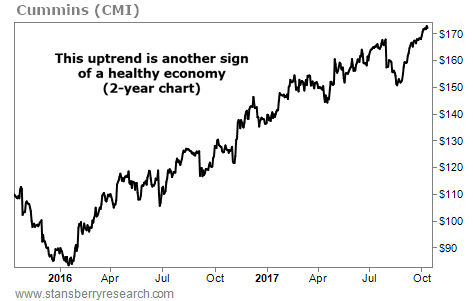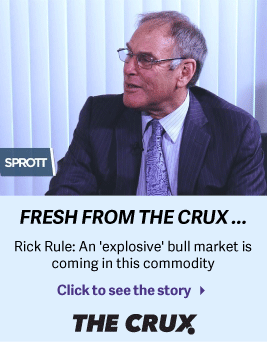| Home | About Us | Resources | Archive | Free Reports | Market Window |
|
Steve's note: Regular readers know that I'm cautious on cryptocurrencies like bitcoin. But you need to understand them... And I'm confident Tama Churchouse, editor at Stansberry Churchouse Research, can tell you everything you need to know. Over the next several days, we'll publish some of his essays on this new technology that's shaking up the investing world...
Bitcoin Will Change How You Think About Money... Here's WhyBy
Thursday, October 12, 2017
I'm writing this from 35,000 feet above the Pacific Ocean, and we're about to begin our descent into San Francisco.
On the obligatory Customs Declaration form, provided by U.S. Customs and Border Protection, I notice I'm required to answer "Yes" or "No" to the following:
Here's a hypothetical question: What if I had $100 million worth of bitcoin on a thumb drive in my pocket... Would I need to declare that? What if I had my bitcoin wallet on my phone?
Or better yet, what if I didn't have anything at all except my public and private bitcoin keys – which are the "passwords" I need to access, spend, and transfer my bitcoin from any Internet-connected device – simply memorized and tucked away safely in the recesses of my brain?
Would I need to declare that?
I'm pondering this question because, despite bitcoin's increasing mainstream adoption and price appreciation, there remains huge debate and skepticism about whether bitcoin is really money...
Bitcoin is digital money that is created and held electronically. At the core of bitcoin technology is a super database called the "blockchain." The blockchain contains every transaction in the history of bitcoin and is accessible to anyone. A lot of people think that blockchain will eventually be used to process everything from stock trades to voting.
One of the positive side effects of bitcoin's march toward mainstream acceptance is that it pushes everyone to reassess their own personal concept of "money."
Plenty of critics say that bitcoin isn't real money. Why not?
Let's take a quick look at some of the hallmark characteristics of what we consider money.
1. Transferability.
Can I move it around, and transfer it from myself to another party and vice versa? Yes.
Bitcoin is far more transferable than traditional fiat currencies (like the physical dollar, euro, and yen)... And it works just as well as any mobile transaction. I can open my phone and securely transfer $100,000 of bitcoin (or more) straight into your digital wallet in an instant.
Of course, you can hand me $100,000 in cash in a briefcase. But I'd need to count it, and check that the notes aren't counterfeit. And then I'd need to secure it. The bitcoin blockchain does all of the above for me. Once I've made the bitcoin transfer and you've seen the balance in your wallet, it's done. That's it. You own those bitcoins.
2. Usability.
Money isn't much good if I can't use it. Can bitcoin be used to buy goods and services? Yes, and increasingly more merchants are accepting bitcoin as a means of payment.
Incidentally, as I write this, I'm scheduled to meet with the CEO of a company which is launching a service that allows you to spend your bitcoin the same way you would use a simple debit card. And you can use this service at more than 30 million locations globally.
Mainstream acceptance is growing every day. Bitcoin is already legal tender in Japan.
3. Scarcity.
Central banks can, have, and continue to create tens of billions of dollars in fiat currency out of thin air. And as a result, currencies the world over collapse, time and again.
Try talking to folks in Venezuela about how much faith they have in the bolivar (the national currency), now essentially worthless. Or Zimbabweans, whose currency collapsed after hyper-printing by their central bank. Or the billion-plus people in India who had their cash lifesavings declared no longer legal tender in an instant last year, when Prime Minister Narendra Modi made a surprise televised announcement informing them they had until the end of the year to exchange their notes for new ones before they would become worthless.
The West is truly spoiled when it comes to relative currency stability versus the rest of the world.
As for bitcoin, only 21 million will ever be minted, according to the bitcoin protocol, and only around 16 million are in circulation today. No central bank or government can "print" more bitcoin.
And as for the concern that bitcoin is purely "digital", it's worth remembering that more than 90% of all money that exists today around the world is not physical (i.e., not notes or coins).
When you're buying bitcoin, you're taking a view that more people around the world will accept bitcoin as a form of money. And with a total market cap of around $80 billion, I think it's a worthwhile view to take.
Good investing,
Tama Churchouse
Further Reading:
"In a few years, the blockchain will allow you to qualify for a loan, conduct a title search, and close on a house in a single day," Teeka Tiwari writes. He explains why blockchain technology will be a revolutionary force to rival the birth of e-mail... and how cryptocurrencies act as "shares" in this new industry. Read more here.
In this essay, Kim Iskyan discusses the way we think about money – in a more personal sense. "Everyone must decide on the meaning and role of money in his or her life," he explains. Learn how these ideas can boost your wealth-building success right here: Three Things I Wish I Had Understood About Money Long Ago.
Market NotesHIGH DEMAND FOR ENGINES BODES WELL FOR THE ECONOMY Today, we see more evidence of an improving economy in the strength of an engine manufacturer...
Longtime readers know we keep an eye on the U.S. economy by looking at healthy consumer spending in industries like hotels, swimming pools, and cruise lines. We've even highlighted how construction equipment can show economic strength. Today, we'll focus on another company that tells us when Americans are driving, building, and digging...
Cummins (CMI) designs and manufactures engines and generators. It's one of the major players in the space, operating in more than 190 countries with annual revenues of around $18 billion. In the second quarter, the company reported a 12% increase in revenue from last year, and pointed to higher demand in several markets – including oil and gas, construction, mining, and trucking. That's a good sign for the economy...
As you can see in the chart below, Cummins shares have been marching higher. The stock has rallied around 60% over the past two years, and it recently hit an all-time high. Look for more gains as the economy keeps chugging along...
 |
Recent Articles
|



